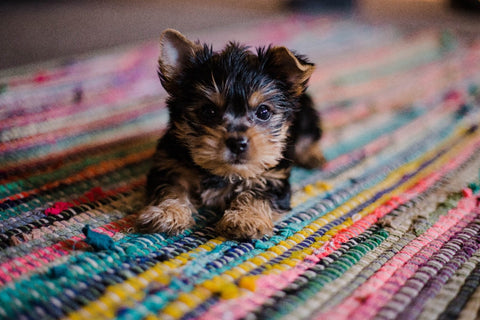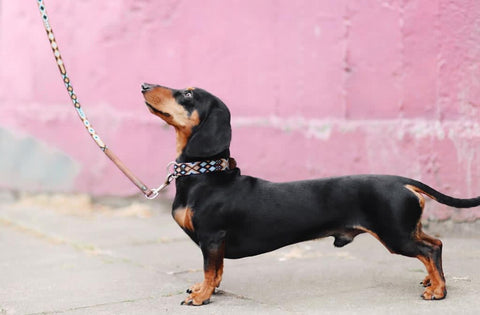Welcoming home a new puppy is a joyous experience, but it also entails a high level of responsibility. Just like human babies, puppies also require proper care, training, and attention to grow into well-behaved and happy dogs.
It's completely normal to feel a mix of excitement, intimidation, and anxiety as you embark on this new journey of becoming a puppy parent. Whether you're a first-time puppy parent or looking to refresh your knowledge, we aim to provide guidance and answer some frequently asked questions to help you navigate the world of puppy parenting with confidence and love.
What is the typical age range that is considered puppyhood?

Puppyhood generally refers to the stage of a dog's life from birth to around one year of age. During this period, puppies go through significant growth and development, both physically and mentally. However, the specific age range can vary depending on the breed and individual dog. Smaller dog breeds may mature faster, while larger breeds may have a longer puppyhood phase. Therefore, it is important to remember that every puppy is unique, and their individual needs and milestones may differ.
How do I create a safe and welcoming environment for my puppy?
Creating a safe and welcoming environment is essential for your puppy's well-being. So, start by puppy-proofing your home, and removing any potential hazards or toxic substances. Designate a cosy space with comfortable bedding where your puppy can retreat when they need some alone time. Provide plenty of appropriate toys and chewing alternatives to keep them entertained. This will also prevent destructive behaviour. Also disinfect your puppy’s toys regularly so that they are germ free.
Also Read: What is Pet Safe Disinfectant?
What should I feed my puppy and how often?
A balanced and nutritious diet is crucial for your puppy's growth and development. Puppies have small stomachs and require frequent meals. It is generally recommended to divide their daily food intake into three to four smaller meals throughout the day. This helps with digestion and prevents stomach upset.
Make sure to consult with your veterinarian to determine the best diet for your specific breed or mix. Puppies generally require high-quality puppy food that meets their nutritional needs so follow the feeding guidelines provided by the food manufacturer and monitor their weight regularly.
Also Read: 5 Ways Dogs Develop Allergies and How to manage them?
How do I potty train my puppy?
Potty training is an important aspect of puppy parenting. Create a regular schedule for taking your puppy outside to go potty. Take them out after meals, naps, and playtime, as well as first thing in the morning and before bedtime. Use positive reinforcement techniques, such as treats and praise, to reward them for eliminating in the appropriate spot. Always be patient and consistent, as accidents are a normal part of the learning process.
How can I socialize my puppy and introduce them to new experiences?

Socialization plays a vital role in raising a well-rounded and confident puppy. Introduce your puppy to various people, animals, and environments from an early age. Therefore, enrol them in puppy socialization classes or arrange playdates with other vaccinated and friendly dogs. Gradually expose them to different sounds, sights, and experiences, ensuring positive associations through treats, praise, and gentle encouragement.
How can I establish a strong bond with my puppy?
Building a strong bond with your puppy is key to a fulfilling and harmonious relationship. Spend quality time together through daily walks, play sessions, and grooming. Additionally, use positive reinforcement training to teach them basic commands and reward good behaviour. Shower them with love, affection, and attention, as this will deepen the bond between you and your furry friend.
What are the essential health checks and vaccinations my puppy needs?

Essential health checks and vaccinations for your puppy include thorough examinations by a veterinarian to assess overall health and detect any potential issues. Common vaccinations protect against diseases like distemper, parvovirus, adenovirus, and rabies. Regular check-ups and vaccinations ensure your puppy's optimal health, early detection of issues, and prevention of contagious diseases. Consult your veterinarian for a tailored vaccination schedule and personalized advice for your puppy's well-being.
Also Read: Parvo Disease: A Comprehensive Guide For Pet Parents
As a beginner puppy parent, it's normal to have concerns and feel overwhelmed at times. However, remember that love, patience, and a willingness to learn will guide you through this journey. By creating a safe environment, providing a nutritious diet, implementing proper training, and fostering a strong bond, you'll set the foundation for a happy and healthy companion. So, embrace the journey, trust your instincts, and cherish the precious moments with your furry friend.
Reference:
American Kennel Club (AKC) - https://www.akc.org/
The American Society for the Prevention of Cruelty to Animals (ASPCA) - https://www.aspca.org/
The Humane Society of the United States - https://www.humanesociety.org/
Source: American Veterinary Medical Association (AVMA) - https://www.avma.org/
PetMD - https://www.petmd.com/



